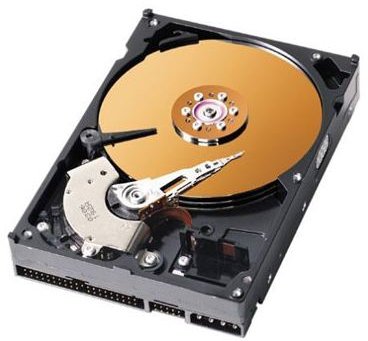Backup Strategies – How Do I Back Up My Computer?
Why should I back up my computer?
Before I get into why you should back up your computer, I first need to explain how data is stored on your computer. Most people don’t realize that unlike most electronic devices, computers store your data on a component called a hard drive that is contained within your computer. Most hard drives are constructed of an outer case, electronics to interface with the computer, a set of platters, actuator arm and a head – similar to an arm and needle used on record players (See figure one). The platters store the information and is placed and retrieved by the head unit. The actuator moves the head into position over the platter while the platter is spinning.
In order for your computer to respond quickly and to be able to store large amounts of data, these components are very precise and thus very sensitive. The platters on most consumer hard drives spin upwards of 7200 revolutions per minute – some faster some slower. Since there are several moving parts within hard drives, it’s not uncommon for hard drives to “die.” Actuators may malfunction and cause the head to scratch the surface of the platter or the mechanism that spins the platter may fail. Depending on the severity of the hard drive failure, many times you are unable to recover any of the information on it.
For this reason it is extremely important that you back up any data you don’t want to lose.
If you think your computer is having issues, keep in mind that not all issues are caused by a hard drive failure. If your computer won’t start up, you may have a different hardware issue or possibly an operating system issue. It’s always best to test the hard drive in a different computer if possible before deciding its dead. To do this, you can purchase a USB enclosure for your hard drive so you can easily test it in another computer.
Thinking About Your Data
When thinking about what you need to back up, anything you create or store on your computer should potentially be backed up. Anything you don’t back up can be lost forever if your hard drive malfunctions or is otherwise damaged.
Start by thinking about items you’ve created. Do you have Word or other Office type documents? If you aren’t sure where to look, start by looking under My Documents on the C: drive. This is the default location documents and other personal items are saved.
Do you have a digital camera or camcorder? Be sure to take note of the location of these files.
Music? Although with most music services, once you’ve paid for a song, you can download it again for free, it may be quicker for you to back up your collection.
Once you have a list of files and folders to back up, you’ll need to set up a backup program to do the work for you on a regular basis. The second article in this series will walk you through some tools you can use and will show you how to back up a hard drive.
This post is part of the series: Guide to Backing Up Your Personal Computer
This series will tell you why it’s important to back up information on your computer in case of a hard drive failure and how to perform backups to protect your data.
